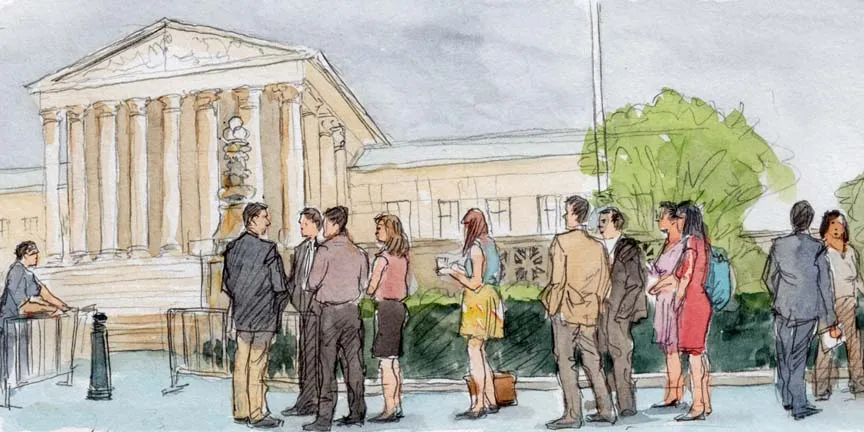Tuesday round-up

on Nov 5, 2019 at 6:59 am

The justices will hear argument in two cases this morning. The first is CITGO Asphalt Refining Co. v. Frascati Shipping Co., Ltd., which asks whether, under federal maritime law, a safe-berth clause in a voyage-charter contract is a guarantee of a ship’s safety or imposes a duty of due diligence. Joel Goldstein previewed the case for this blog. Grant Shillington and Connor Grant-Knight have a preview at Cornell Law School’s Legal Information Institute. [Disclosure: Goldstein & Russell, P.C., whose attorneys contribute to this blog in various capacities, is among the counsel to the respondents in this case.]
Today’s second argument is in Allen v. Cooper, which asks whether the Constitution gives Congress power to revoke the states’ immunity from suit for copyright infringement. This blog’s preview came from Howard Wasserman. Lachanda Reid and Kaitlyn Marasi preview the case for Cornell. At The Fayetteville Observer (via How Appealing), Paul Woolverton reports that “the outcome is expected to have far-reaching implications for numerous businesses and individuals who make money from creating and selling copyrighted works, such as songs, books, pictures, videos and computer software.”
Yesterday the court released additional orders from Friday’s conference, adding no new cases to its merits docket. Amy Howe covers the order list for this blog, in a post that first appeared at Howe on the Court.
At Reuters, Andrew Chung reports that in the first case argued yesterday, Barton v. Barr, the justices considered “whether to make it easier for federal authorities to deport certain immigrants who have committed crimes,” and that they “appeared divided over the fate of Andre Martello Barton, a legal permanent U.S. resident from Jamaica who challenged his planned deportation for drug and gun convictions in Georgia dating back to 1996.” At ImmigrationProf Blog, Nancy Morawetz suggests that the government’s statements during oral argument suggest that it has “missed the breadth of its proposed rule – one that stops the clock for relief based on very minor regulatory violations,” and has “ignored completely that its rule extends beyond convictions to honest testimony years later about conduct during the person’s first seven years living in the United States as a Lawful Permanent Resident.”
At AP, Mark Sherman reports that after yesterday’s argument in second argument in Kansas v. Glover, “[t]he Supreme Court seems ready to say police may pull over a car when they know only that its owner’s license is not valid — even if they don’t know who’s driving.” For The Wall Street Journal (subscription required), Jess Bravin reports that “[s]ome justices questioned whether statistical probabilities were by themselves enough to suspect provide reasonable suspicion a crime was being committed.” Adam Liptak reports for The New York Times that the justices “debated the meaning of common sense, and it turned out that [they] had varying ideas about it.” Additional coverage comes from Nina Totenberg at NPR (audio) and Kevin Daley at the Daily Caller. [Disclosure: Goldstein & Russell, P.C., whose attorneys contribute to this blog in various capacities, is among the counsel to the respondent in this case.]
Briefly:
- Amy Howe reports for this blog, in a post that first appeared at Howe on the Court, that yesterday the justices “refused to halt the execution of South Dakota inmate Charles Rhines.”
- At The World and Everything In It (podcast), Mary Reichard discusses the oral arguments in Mathena v. Malvo, in which convicted Washington, D.C.-area sniper Lee Boyd Malvo is asking the justices to overturn his sentence of life without parole, and Peter v. NantKwest, which involves attorney’s fees in cases challenging patent denials in district court.
- In the latest episode of Strict Scrutiny (podcast), Kate Shaw and Melissa Murray “talk breaking SCOTUS news; preview three cases from the upcoming November sitting — DACA, Hernandez v. Mesa, and Comcast; and go deep on amicus invitations and (lack of) diversity in the Supreme Court bar.”
- At Fix the Court, Tyler Cooper criticizes a recent proposal for reforming the Supreme Court, known as “the ‘Balanced Bench,’ or the 5-5-5 Plan,” raising constitutional and policy concerns.
- At Reason (via How Appealing), Damon Root looks at the federal government’s cert petition in United States v. California, “which asks whether California’s status as a ‘sanctuary state’ is illegally hampering federal immigration law”; citing Supreme Court precedent, he argues that “[i]f it’s unconstitutional for the feds to commandeer the states into enforcing a federal gun control scheme, it’s also unconstitutional for the feds the commandeer the states into enforcing federal immigration policy.”
We rely on our readers to send us links for our round-up. If you have or know of a recent (published in the last two or three days) article, post, podcast or op-ed relating to the Supreme Court that you’d like us to consider for inclusion in the round-up, please send it to roundup [at] scotusblog.com. Thank you!


